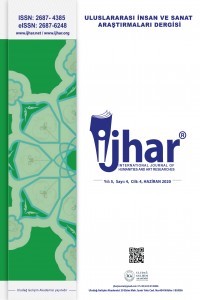
Uluslararası İnsan ve Sanat Araştırmaları Dergisi
Yazarlar: Süheyla SARITAŞ, Aslıhan BOZKURT
Konular:Beşeri Bilimler, Ortak Disiplinler
Anahtar Kelimeler:Motherhood,Socioeconomic Status,Motherhood Experiences,Interpretative Phenomenological Analysis,Class
Özet: Throughout the history, socio-economic, cultural and political changes and transformations occurred in the structures of societies have also affected the basic institutions as well. As one of the basic institutions, the family and its elements have also been affected as mentioned above too. Undoubtedly, as one of the most basic actors of the family, woman and her roles and responsibilities are worth to examining all period. Because the changes which are experienced very fast in modern world, it is certain that woman tries to position her own place and creates her identity, just like all the individuals in society. The factors for the changes in the structures of the family have been shown in the roles and responsibilities of the woman and her active role in the public sphere. The perception in traditional societies is where man positioned outside the house and woman in the house is now abandoned, specifically in modern societies. On the other hand, as woman entered the work life, the social structure made her part of social division of labor and also forced her to continue her traditional roles and models. Especially, the woman who has experience of motherhood has also become an important actor in working life while she is dealing with child care and house work. The phenomenon of motherhood is defined as a term that means the practical realties and social importance of being a mother. This idea evaluates that motherhood is a socio-cultural phenomenon apart from a biological experience. In other words, the experience of motherhood is a social and cultural aspects rather than an individual. Motherhood and maternity experiences are not only individual experiences but also be evaluated as an identity of woman and existence of woman by means of social status. The perception of motherhood which has changed in human history is generally defined and shaped as a social role and responsibilities al almost all societies. For his reason, the different motherhood roles emerged in different cultures and periods. This study is about how mothers interpret motherhood, what are the strengths and weaknesses during motherhood cycle, generally accepted motherhood best practices, parental education, resources to which mothers refer during motherhood experiences, generally accepted motherhood model, relationship between mother and child, child care, challenges faced in terms of child care and parenting, how changes in financial income affect motherhood in general, the effects of social media and motherhood models depending on socio-economic status. Main focus throughout the research is on motherhood experiences. The research is a qualitative case study for which Interpretative Phenomenological Analysis (IPA) is adopted utilizing interviews performed with 40 mothers that live in Balikesir. This research reveals the fact that motherhood models change depending on the socioeconomic status; there are some instances in which socioeconomic status does not matter though. The study revealed that motherhood experiences do not change according to class difference and every mother has high consciousness and awareness to this experiences. Today motherhood experiences are obtained not only from a previous generation or social environment but also virtual environment, knowledge transmitted from masters, scientific information. This situation has revealed that motherhood experience is related to the cultural change and transformation.
Dergi editörleri editör girişini kullanarak sisteme giriş yapabilirler. Editör girişi için tıklayınız.